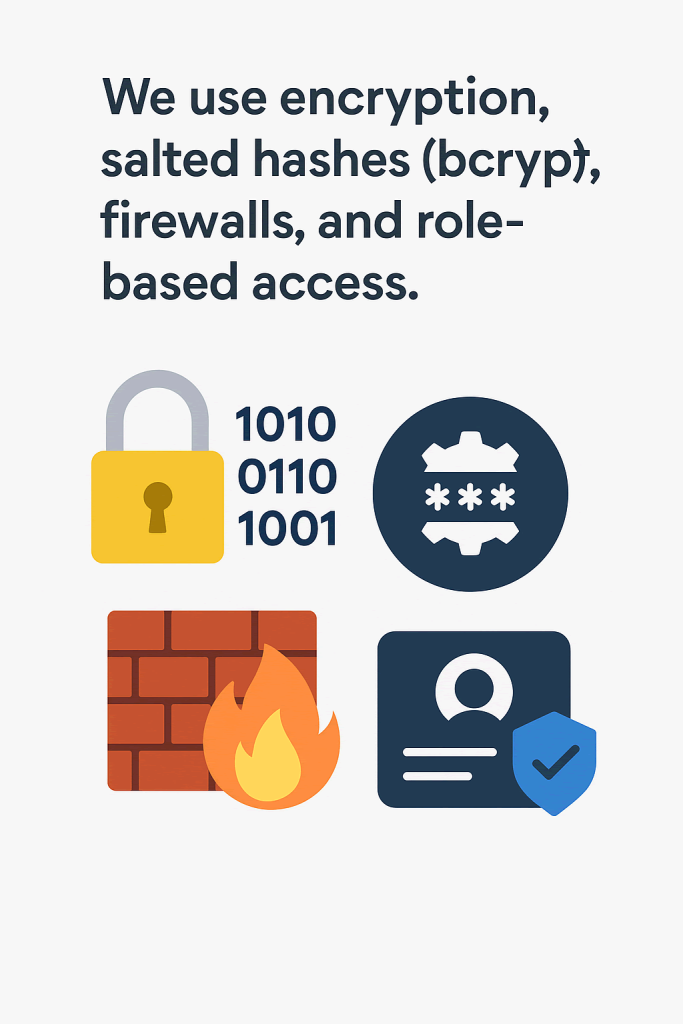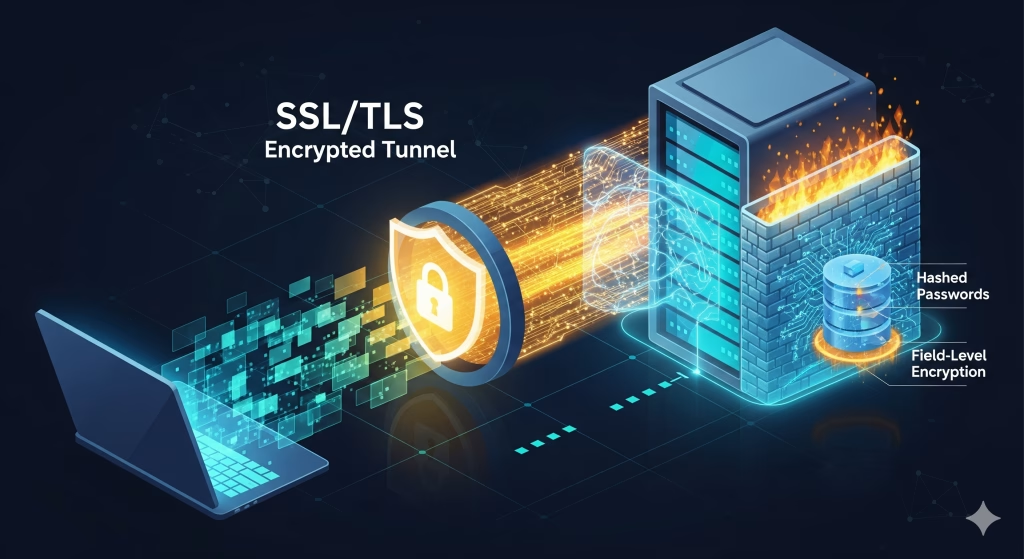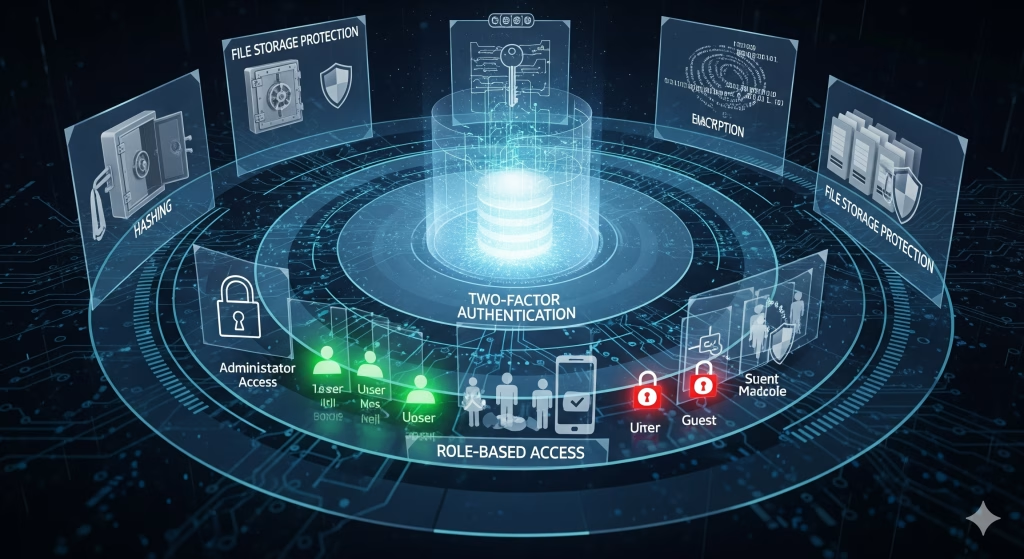At Wemaxa.com, user data security is built into every layer of our services from the ground up. We treat it as a critical responsibility, not just a feature. Every project we deliver follows strict protocols to ensure that personal, transactional, and behavioral data is protected during storage, transmission, and processing. Whether you’re running a simple contact form or a high-traffic online store, security is always prioritized in our planning and execution.

All user data is stored using secure database configurations with access controls that limit who can read or modify sensitive information. Passwords and other authentication details are hashed using industry-standard encryption algorithms, ensuring they cannot be read even if accessed. We also use secure file storage systems with controlled permissions and regular audit trails to monitor data access and changes. Where applicable, we implement field-level encryption for particularly sensitive data like billing details or identity information.
🔐 Regular Backups & Monitoring
- Daily encrypted backups of databases and critical files.
- Logs are shipped to secure remote locations.
- Intrusion Detection Systems (IDS) like RKHunter, ClamAV, and server audit scripts are in place.
Communication between your website or application and users is protected by SSL encryption, ensuring that data exchanged over the network cannot be intercepted or altered. We also configure firewalls, automated security scans, and intrusion detection systems to protect server infrastructure from external threats. Updates and patches are applied promptly to keep all components current and reduce exposure to known vulnerabilities.
🔐 Compliance & Best Practices
- Follows principles aligned with GDPR, CCPA, and OWASP Top 10.
- Data retention policies available for clients with compliance requirements.
- Client agreements can include DPA (Data Processing Addendum) if needed.
🔐 1. Data Storage Security
✅ Encrypted At Rest
- Databases are encrypted using industry-standard AES-256 encryption.
- Sensitive data (passwords, tokens, API keys) is stored hashed and salted using bcrypt or Argon2.
- On managed platforms (AWS RDS, Firebase, etc.), built-in encryption at rest is enabled by default.
✅ File Storage Protection
- User-uploaded content is stored in isolated folders.
- File system permissions restrict access to service-level accounts.
- Optional object storage encryption (S3 or equivalent) for uploaded assets.
For clients on higher-tier service plans, we offer advanced options like role-based access control, two-factor authentication, and compliance alignment with standards such as GDPR or CCPA. Backups are encrypted and stored off-site to ensure data recovery in the event of an emergency. At Wemaxa, safeguarding your user data is a core part of what we do — not just to meet expectations, but to build lasting trust in every solution we deliver.
🔐 2. Secure Data in Transit
- All data transfers are protected by HTTPS (TLS 1.2/1.3).
- SSL certificates are auto-renewed via Let’s Encrypt or managed certificates.
- Backend API requests also use encrypted channels or private subnets in cloud deployments.
🔐 3. Authentication & Access Controls
✅ User-Level Security
- Passwords never stored in plaintext.
- 2FA available for admin-level dashboards.
- Optional OAuth2 or social logins via Google, Apple, or GitHub with secure token handling.
✅ Role-Based Access Control (RBAC)
- Permissions are scoped by roles (e.g., admin, editor, user).
- Access to endpoints and UI elements is gated based on the role model.
🔐 4. Database Security Hardening
- Remote database access is disabled by default.
- Firewalls and Fail2Ban prevent brute-force login attempts.
- SQL injection protection via ORM sanitization (e.g., Sequelize, Prisma, TypeORM) or query whitelisting.
MORE LINKS:
What is Fullstack?
What is Backend?
Supported Databases
API creation
3rd party services
Hosting Setup
Backend developer
Project scaling
Average turnaround
How is user data stored securely?
When discussing how user data is stored securely, Wemaxa approaches the subject as a complete system rather than a single technical step. Data security begins the moment a user interacts with a website or application, and it extends through storage, transmission, backup, and eventual deletion. At the most fundamental level, we apply **end-to-end encryption** practices. This includes enforcing **Transport Layer Security (TLS)** for every request, which guarantees that data transmitted between the client and the server cannot be intercepted or altered by malicious third parties. This applies to logins, form submissions, financial transactions, and any other action where sensitive data is exchanged. Once data arrives at our infrastructure, it is encrypted at rest using **AES-256 or equivalent strong algorithms**, ensuring that even if a physical server or disk is compromised, the data remains unreadable. Sensitive user identifiers such as email addresses, phone numbers, or payment details are further segregated into secure storage partitions that can only be accessed through tightly controlled application processes. Passwords, which represent one of the highest-risk assets in any system, are never stored in plain text. Instead, we use **salted hashing with bcrypt or Argon2**, both of which are adaptive hashing algorithms specifically designed to resist brute-force attacks, rainbow table exploits, and hardware-based cracking attempts. Each password is given a unique salt to ensure that even identical passwords produce completely different hashes, making large-scale leaks far less exploitable by attackers.

Security cannot be guaranteed through encryption alone—it requires architectural foresight and layered defenses. Wemaxa isolates critical database servers within **private subnets** that are invisible to the public internet, ensuring that no attacker can directly query or probe them without first breaching multiple layers of authentication. Application servers act as controlled gateways, and these are themselves protected through **firewall rules**, **intrusion detection systems (IDS)**, and network segmentation to reduce exposure. Every administrative or developer-level access is gated through **multi-factor authentication (MFA)** and restricted via **role-based access control (RBAC)** policies. For example, developers may only access certain staging databases with anonymized data, while production environments are restricted to a handful of vetted engineers with time-limited credentials. Wemaxa enforces **least-privilege principles**, meaning that every system component and every team member only has the access strictly required for their task and nothing more. All access attempts, whether successful or denied, are logged and monitored in real time, allowing for rapid identification of anomalies or suspicious behavior. Combined with **continuous monitoring and audit trails**, this ensures that insider threats, misconfigurations, or breaches are quickly detected and mitigated before they cause lasting damage.
Password management deserves special emphasis because it remains the most common attack surface for many digital platforms. Wemaxa strictly avoids insecure practices such as storing recoverable passwords or reusing legacy hashing algorithms like MD5 or SHA-1. Instead, we rely on **bcrypt and Argon2**, which are designed to be computationally expensive, slowing down brute-force attempts even with powerful hardware. Each user password is hashed with a random salt, and the cost factor is tuned to balance security with performance, allowing hashes to resist attacks for years. Even if an attacker somehow gained access to the raw database, they would not be able to reverse-engineer the original password values. Furthermore, we implement account-level protections such as **rate limiting**, **progressive lockouts**, and **suspicious login detection** to prevent automated bots from testing credentials. Wemaxa also supports integration with **passwordless login systems** and **single sign-on (SSO) providers** where appropriate, further reducing the reliance on user-managed credentials and increasing overall resilience against credential theft.
Another critical layer of user data protection comes from **role-based access control (RBAC)**, which ensures that even within a business, sensitive data is only accessible to the right people. For instance, a customer support representative may have permission to view support ticket metadata but will not be able to access stored credit card numbers or detailed user authentication data. Developers may work with anonymized datasets rather than raw production databases to maintain privacy while still enabling effective testing. At the database level, permissions are segmented so that even if one account is compromised, the attacker cannot gain access to everything. Wemaxa enforces separation of duties, meaning that no single person can independently modify sensitive systems without oversight. This dramatically reduces the potential for insider abuse and makes unauthorized data exfiltration extremely difficult. These measures are paired with **application-layer validations**, which check user actions against permissions before every critical operation, preventing privilege escalation or access bypass attacks.

Data storage also includes the challenge of backups, disaster recovery, and continuity planning. Wemaxa configures **automated, encrypted backups** of all production databases at regular intervals. These backups are stored both on-site and off-site, with strong encryption applied during transfer and at rest. Each backup is assigned a retention period aligned with client compliance requirements, and old backups are securely purged to prevent unauthorized access. Crucially, we do not simply store backups—we also conduct **routine restoration drills** to ensure that backups are valid, uncompromised, and restorable at scale. This means that in the event of accidental data loss, ransomware attacks, or hardware failures, systems can be restored to a working state quickly and with minimal data loss. Logs are maintained to document every backup and restoration event, creating full transparency for compliance audits and operational reviews.
Compliance with regulatory frameworks is another dimension of secure data storage. Wemaxa aligns its practices with global standards such as **GDPR** for European clients, **HIPAA** for healthcare projects, and **PCI-DSS** for platforms handling payment data. This includes implementing **data minimization strategies**, **explicit user consent tracking**, **right-to-be-forgotten workflows**, and **data subject access request processes**. For clients requiring higher levels of assurance, Wemaxa integrates **encryption key management systems (KMS)** such as AWS KMS or Google Cloud KMS, ensuring that keys are stored separately from data and rotated regularly. Advanced methods like **tokenization** and **pseudonymization** further reduce exposure by replacing sensitive identifiers with placeholders, minimizing the damage of potential leaks. All compliance measures are documented and validated so that clients can confidently meet the requirements of auditors, regulators, and industry standards.

Finally, Wemaxa recognizes that user data security is not a one-time configuration but an ongoing process. Threat landscapes evolve constantly, so we implement **continuous monitoring and vulnerability management**. This includes applying patches to operating systems and libraries as soon as updates are available, running automated scans for known vulnerabilities, and conducting regular penetration testing to identify weaknesses before they are exploited. We aggregate logs into centralized monitoring systems, where AI-driven anomaly detection can highlight suspicious activity, such as sudden spikes in database queries or repeated failed login attempts. Alerts are configured to escalate to our security team immediately, ensuring that incidents are addressed in real time. Through this cycle of prevention, detection, response, and continuous improvement, Wemaxa guarantees that user data is not just stored securely at one moment in time but remains protected over the lifetime of the application, adapting to new risks as they emerge.
In conclusion, Wemaxa’s data security strategy rests on multiple integrated pillars: encryption in transit and at rest, strong password hashing and authentication systems, RBAC enforcement, network segmentation, encrypted backups, compliance alignment, and continuous monitoring. Each of these elements reinforces the others, creating a defense-in-depth architecture that secures sensitive data against a wide range of threats. By designing systems with both technical rigor and operational foresight, Wemaxa provides clients with a level of assurance that user data will remain confidential, protected, and available even under challenging circumstances. This multi-layered, evolving approach ensures that as businesses grow and regulatory demands increase, their data infrastructure remains trustworthy and resilient, safeguarding both the organization’s reputation and its users’ privacy.


